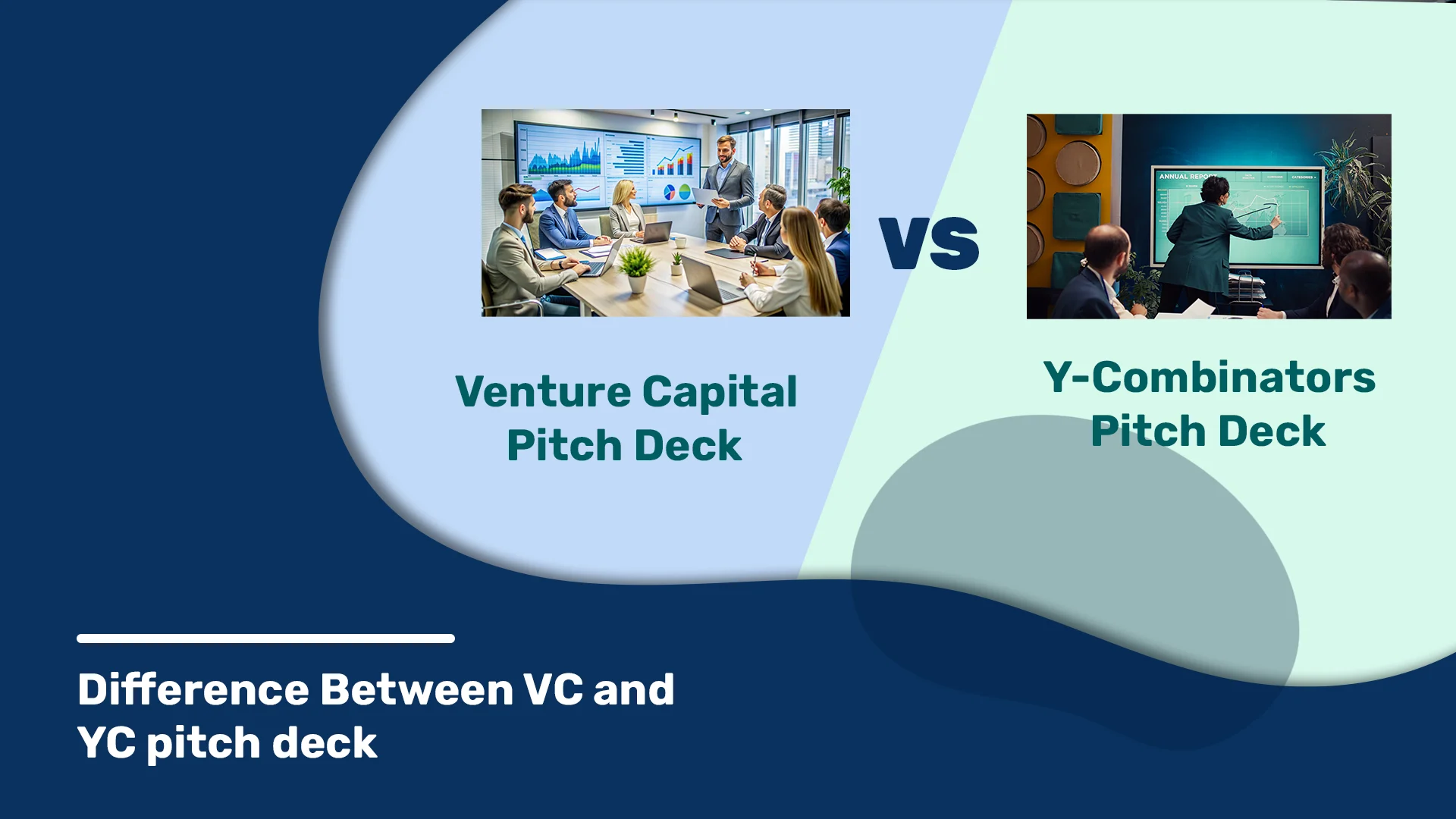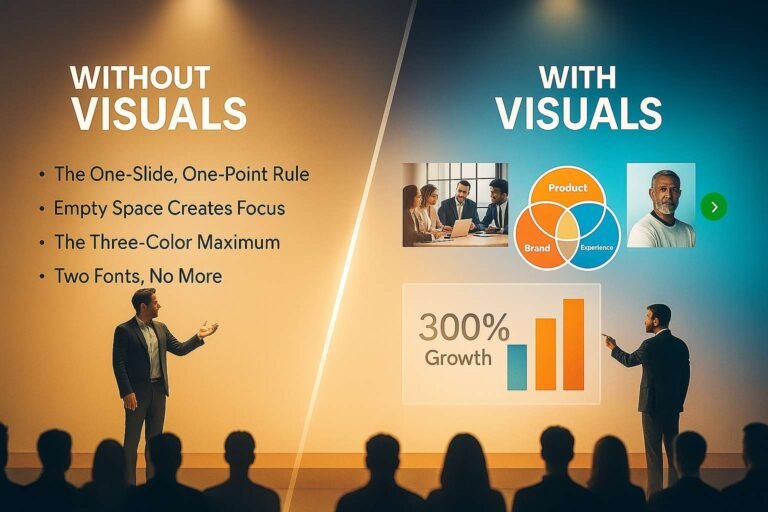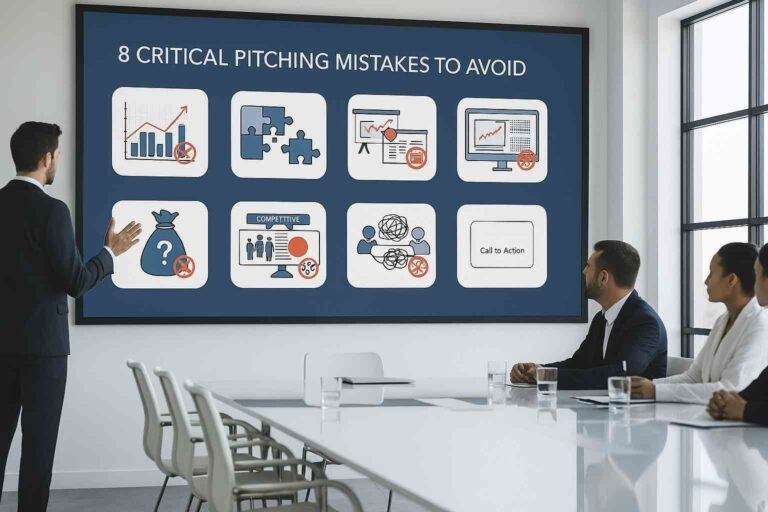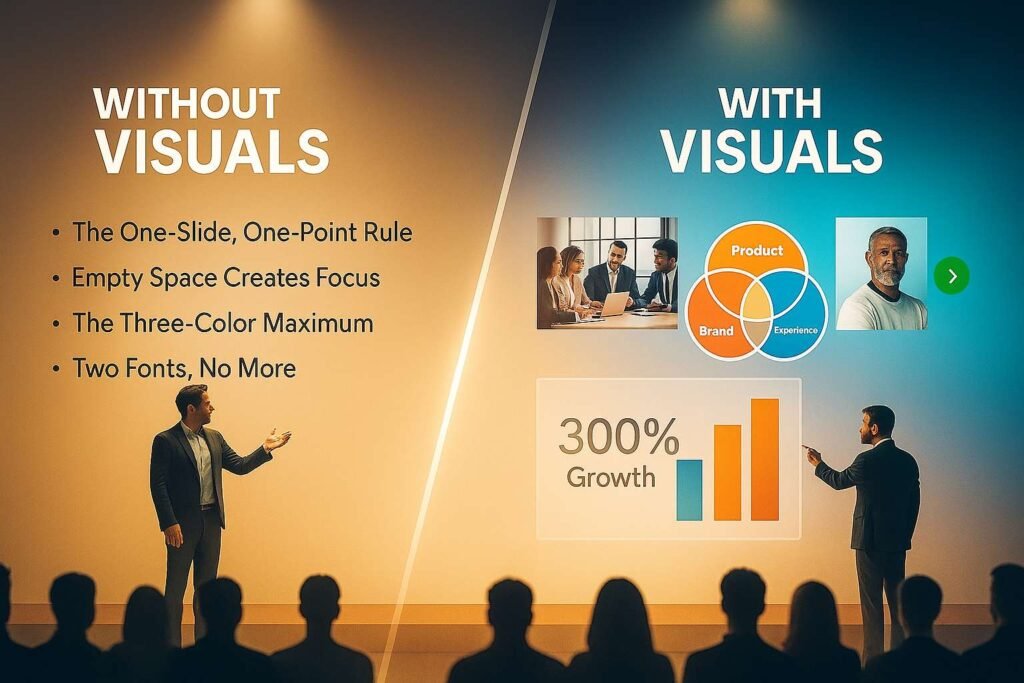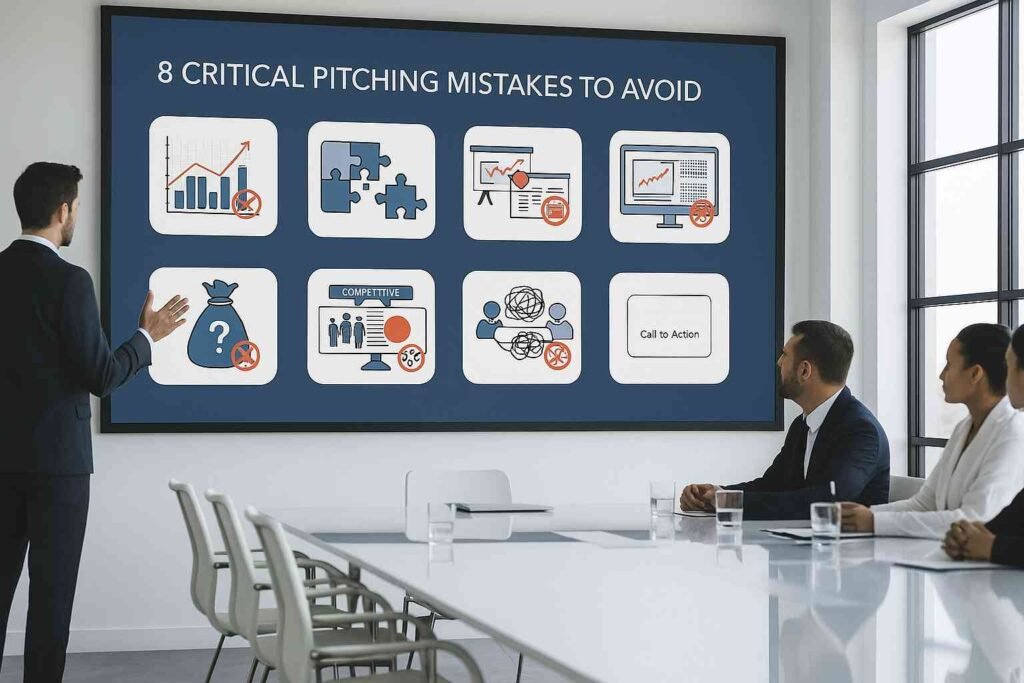Introduction
Pitch decks are a fundamental part of the startup ecosystem, acting as the foundation upon which founders communicate their business ideas to investors. It does not matter if you are trying to get funding from VCs or apply for Y Combinator (YC) with your project; how you construct and present your pitch deck can change it all. No matter the audience—whether a VC firm or a seed fund accelerator like YC- you make sure to put an emphasis on understanding how our presentation comes into contact and how it resonates with them most. Different Kinds of Investors Have Different Needs; Show them all in your deck.
This blog will study how pitch decks made for VCs are different from the ones that usually get selected by YC. We will define all the types of investors, give you insight into pitch deck requirements based on each one, and show you how they slightly differ in components from slide to slide.
Who are YC and VC?
Y Combinator (YC):
YC is the world’s most famous and influential startup accelerator, which funds startups at its own discretion in return for mentorship, networking opportunities, and access to a huge pool of resources. Open to everyone, YC has previously funded successful startups such as Airbnb, Dropbox, and Stripe; the program is tailored toward helping selected startups focus their business model while accelerating scale. YC’s criteria usually center around the founders, problems, and scale as opposed to the present financial return.
Venture Capitalists (VCs):
Venture capitalists (VCs) are basically those individuals or firms who invest pooled funds provided by their investors -famously known as venture capital firm- into high-growth potential companies in exchange for equity. Maintaining a healthy financial return on their investment is greatly important to VCs, thus adopting an active-support role in startup development and providing them with strategic guidance, industry connections, and other cultivation that will help the startup grow. The VC process is quite varied and can involve multiple rounds of funding, each with its own expectations and due diligence requirements.
What is a YC Pitch Deck?
For those who are unaware of what it is, a YC pitch deck is a document (pitch) made to get accepted into one of the best start-up accelerators in the US, period! We do not have information on what is there in this particular deck, but we can infer from the name that it highlights how much big startup will be, the founding team, and the problem-solution fit. Original YC pitch decks have tended to be sparse and directional, helping communicate the specific vision of what they were trying to build and why it needed support.
Key Components
Typical elements of a YC pitch deck include:
- Problem and Solution: Clearly define the problem you are solving and how your solution is uniquely positioned to address it.
- Business Model: Explain how your startup plans to make money, focusing on simplicity and scalability.
- Market Size: Provide data on the size and growth potential of your market, emphasizing the opportunity for significant impact.
- Team: Highlight the founding team’s background, experience, and why they are uniquely qualified to lead the startup.
- Traction: Showcase any early success, such as user growth, partnerships, or sales, to validate your business concept.
What is a VC Pitch Deck?
A VC pitchbook is a broader investment proposal to gain an investor’s commitment from venture capital partnerships. VC decks are generally more detailed than YC pitch decks, as they often include a thorough business plan, market analysis, and financial projections. By persuading VCs to invest, the fundamental aim is clear: that this will be a profitable start-up one day soon, and you would all look rather foolish for denying me investment earlier on.
Key Components
Key elements of a VC pitch deck include:
- Executive Summary: A concise overview of the startup, its mission, and why it’s a compelling investment opportunity.
- Market Analysis: In-depth research on market size, target demographics, and competitive landscape, demonstrating a thorough understanding of the market conditions.
- Competitive Landscape: An analysis of key competitors and how your startup differentiates itself.
- Financial Plan: Detailed projections of revenues, expenses, and cash flow, including funding requirements and how the capital will be used.
- Exit Strategy: Outlines potential ways for investors to realize their returns, such as acquisition, IPO, or other exit opportunities.

Differences Between VC and YC Pitch Decks
YC Focus:
On most of the YC pitch decks I saw during my time at Y Combinator, it was concept, team, and problem-solution fit. This is because they value most the potential of its founding team and ability to scale fast with their help. There is less focus on detailed financial projections (since they have little basis in reality at that point) and more of an emphasis on showcasing innovation, market need, early traction, etc. YC decks are often short and to the point—showing slides that instantly get across what you want to do, and why they should care.
VC Focus:
On the other hand, VC pitch decks need deeper insight into business models, market analysis, and financial details. We are bringing in VCs who actually want a return on their capital and, thus, by definition, need to understand why this business will scale and how the company is making money. Consequently, VC decks typically contain more information—e.g., robust datasets, financial projections, and extensive risk analysis to account for other perspectives/views from investors beforehand.
Do Slides Differ Between VC and YC Pitch Decks?
YC Slides:
YC slides are generally less suggestive, they usually convey the vision and data one would eventually need to convince an investor in a short span. Create a perfect YC pitch deck whose emphasis is to tell stories and make a strong narrative about the team and product. Try to avoid mistakes while creating a YC deck. The design is generally minimal, to avoid diverting from the main message with complex visuals or heavy text.
VC Slides:
VC slides can be more specific and broad, addressing in most cases VCs concerns about risk mitigation/long-term profitability. Create a VC pitch deck with data-heavy decks with lots of market research, thorough financial models, and competitive analyses. The design may be a little more intricate, showing information in an easy and understandable manner, but the bottom line is — it has to inform as well as persuade so that investors are fully aware.
Customization for Audience
It will be different for everyone but the bottom line is your presentation should aim at achieving this strategy so make sure to shape in accordance with it. YC decks should be story-oriented, focusing on the problem, solution and your team — dead-set by a strong call for action that fits within YC’s goal of backing truly high-growth companies. Conversely VC decks should be data-rich and detail-packed on the financials, addressing investor concerns about just how strategic is it for them to expect a venture-scale return from this same business.
Conclusion
Knowing that difference is key to making an engaging pitch at vc and yc. While YC pitch decks are based around the idea, the team, and growth, VC decks require greater financials, market analysis, and a business model. Nail your pitch knowing who you are pitching and adjusting your deck to meet their expectations is critical.

